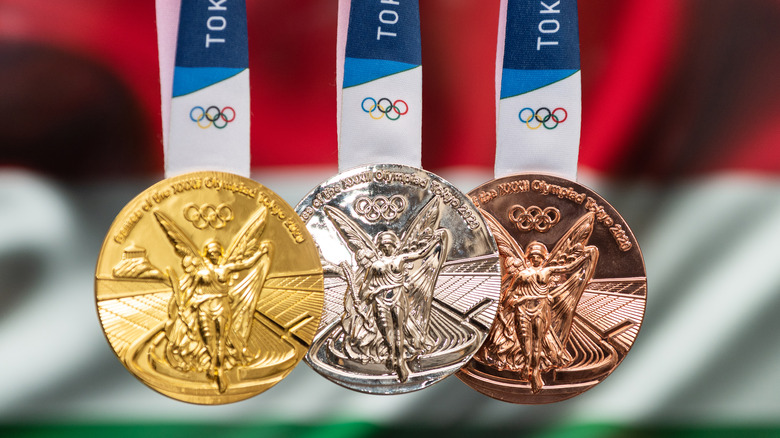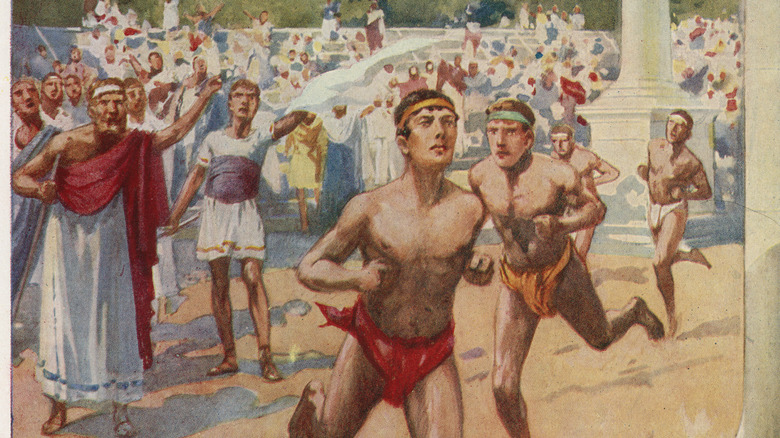The First-Ever Olympic Race In History Was Won By Someone You Wouldn't Expect
The world of sports, all too often, is dominated by the superstars. The ultra, ultra rich. Naturally, these are the athletes that fans pay to see (and pay handsomely at that), and so many of them have accrued incredible fortunes. The legendary Michael Jordan, for instance, per Celebrity Net Worth, is worth an incomprehensible $2.2 billion.
It's not just about prowess on the pitch, court, or wherever your game happens to be played, however. The likes of Michael Jordan have all manner of sponsorship deals and endorsements to bring cash in, both while they're playing and after retirement. The greatest players in the world become brands in their own right.
The International Olympic Committee states that some of its most fundamental aims are "Protecting clean athletes and keeping sport fair." Over the years, this has meant that professional athletes have had no role, or a limited role, in the Olympic Games, allowing those who aren't world-famous multi-millionaires to represent their nations and compete with the eyes of the world upon them. The very first Olympic race winner, it seems, personified this concept: a determined, ordinary competitor nobody would have tipped as a fantastic athlete.
The incredible history of the Olympic games
The Olympic Games, as we know, have a long and storied history. The first modern international games took place over a century ago, Olympics reports. The 1896 Summer Olympics was held in Athens from the 6th to the 15th of April. More than 200 athletes from around the world competed in a total of 43 events, and (per Olympics) Greece came out on top with 47 medals in all (the next-most successful nation, the United States, scored 20).
Greece's most celebrated success story at the event was surely the Marathon, which, reportedly, was won by its very own Spyridon Louis. A great little nod to history, given the marathon's significance.
On the subject of history, the classical Olympics dates back further still. Much, much further. According to History, the Ancient Greek games, which were dedicated to the mighty Zeus, were being held up to 3,000 years ago. They were quadrennial events, and at the very first, a race was won by a humble and enterprising chef.
Coroebus of Elis was the first known Olympic winner
Today, we hold huge, multi-discipline-spanning extravaganzas. The Summer 2020 Tokyo Olympics, per Olympics, was the biggest ever, with a total of 339 events in all. It wasn't always quite that ambitious, though.
History explains that writings from 776 B.C. are the earliest surviving evidence we have of the ancient Olympics. At that year's event, it seems, there was a grand total of one race. The distance covered was 192 meters, and the victor was one Coroebus, a cook.
Whether Coroebus of Elis was the very first champion of the Olympics is unclear. In Robert Bedrosian's translation of Eusebius' "Chronicle," It is stated that, according to Aristodemus of Elis, Coroebus' victory that year took place in the 28th Olympiad, and that this was simply the first one in which winners' names were recorded for posterity.
Ancient Greek writers and historians were often loath to agree on all sorts of things, so it's really impossible to say whether this sprightly cook was the very first winner or not. Ultimately, perhaps it doesn't matter. The important thing is that Coroebus of Elis is part of a long, proud tradition of athletic talent that continues to be celebrated today.


